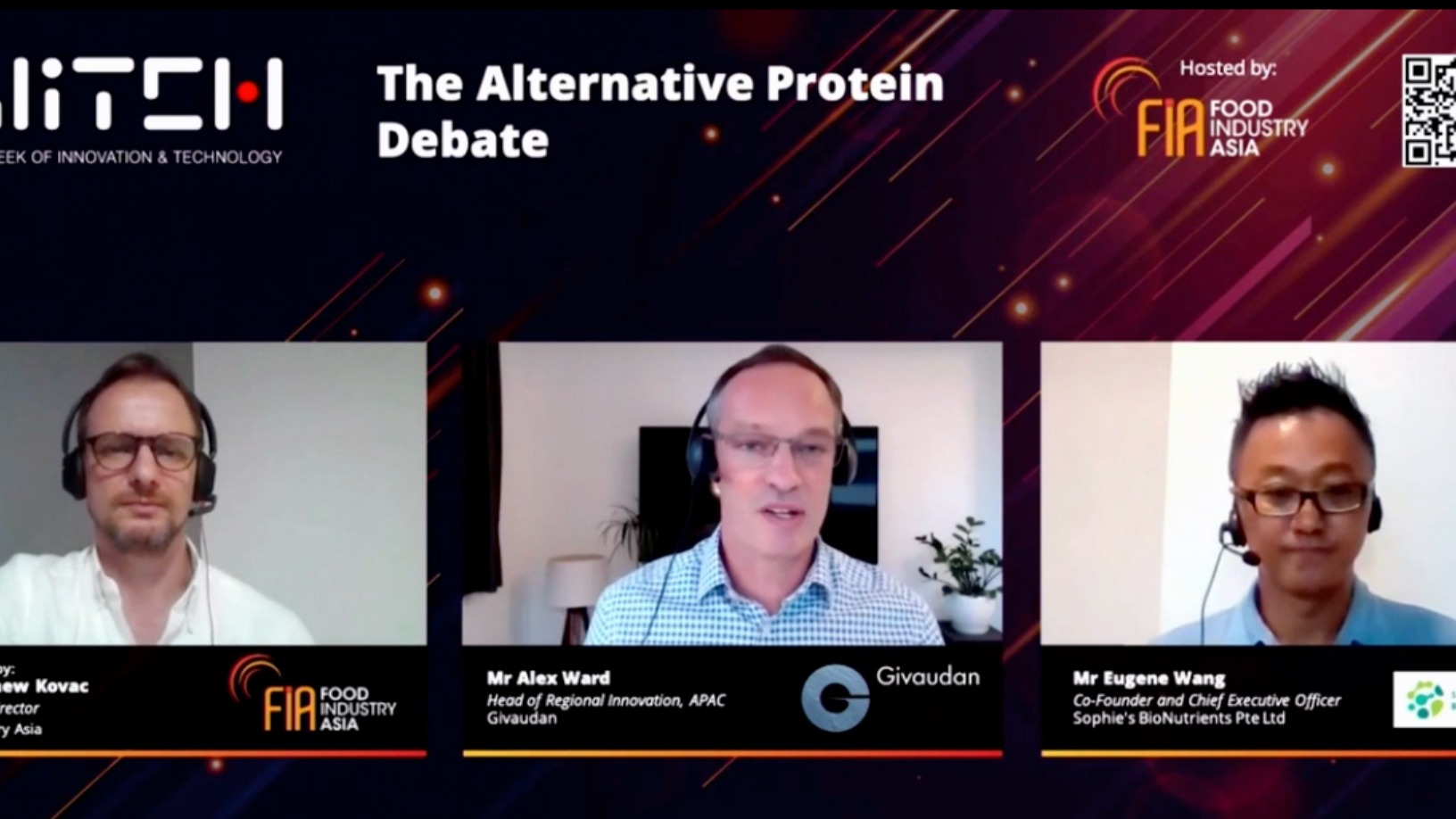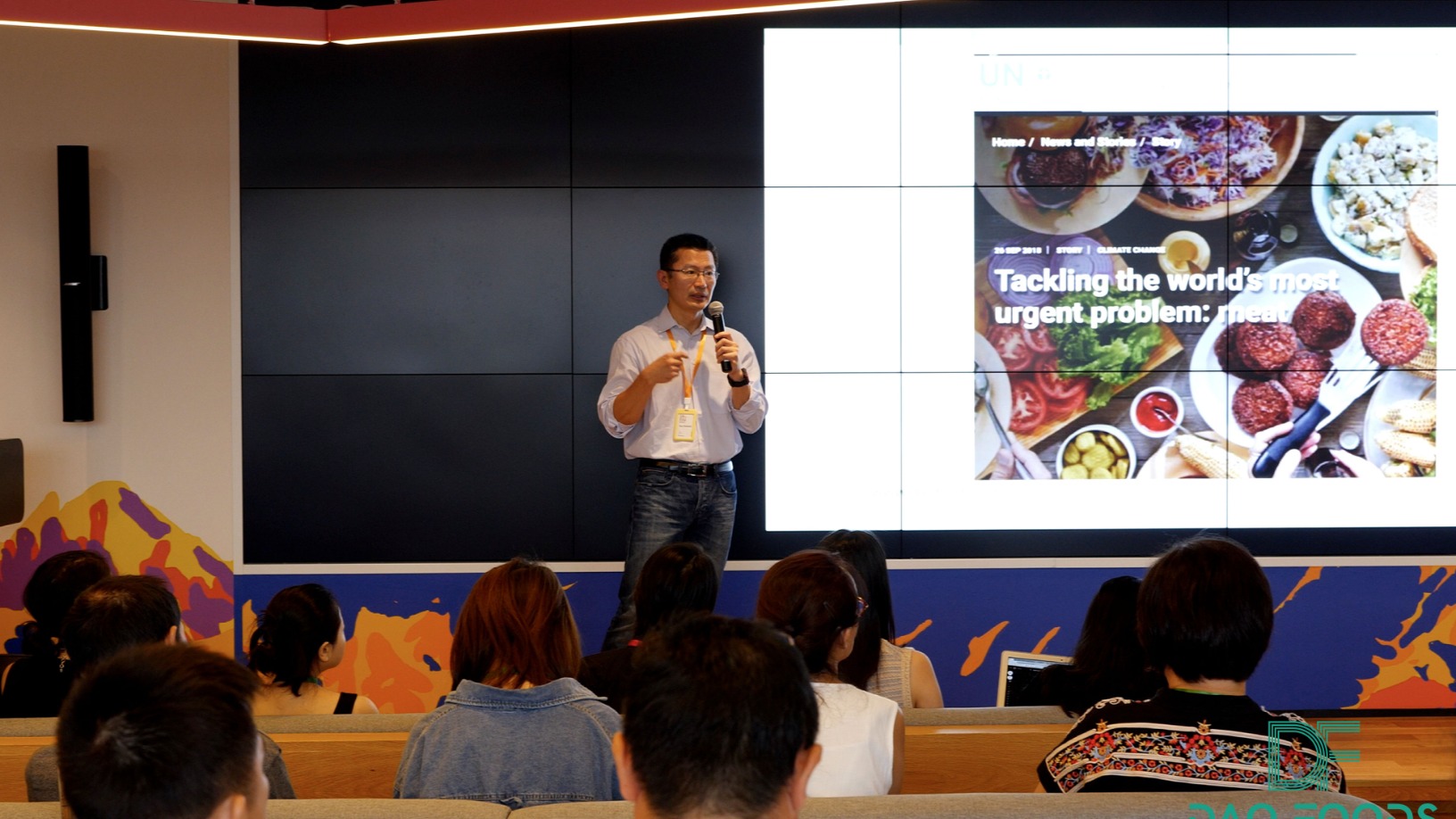A string of recent factors from the African swine flu to the Covid-19 pandemic has propelled alternative proteins into the limelight. To help feed the world’s growing population, estimated to reach nearly 10bn by 2050, in a more sustainable way, foodtech startups have played a big role in developing new types of non-meat proteins in labs and taking them to market.
Eugene Wang, co-founder and CEO of the pioneering plant-based seafood provider Sophie's Kitchen and microalgae protein fermentation startup Sophie's BioNutrients, believes alternative protein will take off as prices of existing protein sources continue rising and the world is running out of space to produce enough food.
In a panel discussion during the Singapore Week of Innovation and TeCHnology (SWITCH) 2020, Wang joined Alex Ward, Head of Innovation APAC at Givaudan, and moderator Matthew Kovac, Executive Director of Food Industry Asia, where they shared their views on trends in the alternative protein space and their implications for the Asian market. Givaudan, one of the world’s biggest flavors and ingredients companies, as part of its work helping F&B businesses create tastes and flavors has begun tweaking its technologies for applications in the alternative protein space.
The following discussion has been edited for length and clarity.
Matthew Kovac: Is alternative protein like plant-based meat necessary in Asia where the majority of people are still eating plants?
Alex Ward: I think that plant-based meat is going to play a huge role in the region. People here are already eating plant-based foods like tofu and tempeh, and soy-based products are a regular part of their diets. As people become more aware of the impact of animal farming on the planet, and the potential of unsafe meat-based products, plant-based alternatives will take place in the regular repertoire of meals.
We're not expecting a full meat replacement, but as a healthier alternative ingredient that you can choose maybe once or twice a week. You can cook exactly the same way that you're already cooking, but with a healthier and more nutritious option that's better for the planet. It's early stage, but the opportunity is significant.
Eugene Wang: I don't consider tofu and tempeh as plant-based meat because they are such a part of the traditional diet in a lot of places in Asia. It doesn't really have meat texture. But that's exactly why I believe that alternative protein will take off. Tempeh and tofu have been around for hundreds, even thousands, of years. So when you talk to people about the production process, it is a lot easier to convince them that this process is a lot healthier and natural than any kind of plant-based burger.
What we as industry participants need to do is to give people another different kind of plant-based protein source, to add more options or protein sources. And by that, using the traditional Asian plant-based foods like tofu the tempeh, I believe people will naturally like it and accept it. But this is only specific to Asia.
In Asia, there are those who are willing to try new things, but there's a very strong local food culture, which remains extremely traditional despite some westernized diets. How do you see this playing out with consumers?
Ward: It all boils down to the cooking and eating experience. In Singapore, people love their food and won't compromise on that experience. If there are foods traditionally made with pork mince or seafood, they could potentially be made with a combination, a hybrid of plant-based products like tempeh or tofu and something cell-based or algae-based. It’s a way to introduce people to a great-tasting product that is better for the environment and could be the fastest route to commercialization without compromise on taste or cooking experience.
Wang: Think aboutthe fish ball Singaporeans love today. About 20 to 30 years ago, fish ball was 70% fish and 30% plant. Now it's the reverse, 70% plant-based and 30% fish. Going forward, the same thing will apply to the Chinese siu mai, or such kinds of processed foods. There will be very popular hybrid products coming out in market made with alternative proteins. They will not be 100% plant-based, because consumers here in Asia, especially East Asia, like consistency – consistency in price, quality and flavor.
What are we seeing in terms of the price of plant-based meat in the future?
Ward: As scale comes into the system over time, the price will come down. The technology to create and manufacture these products is there today, so the main cost is the input cost of the raw materials. With R&D, we can get a cost-effective and consistent raw material supply, which enables local manufacturing. If we can work with ingredients that are available locally in the markets where the manufacturing takes place, I believe the price point is really going to be controlled by the supply chain.
How will technological advances really help?
Wang: When commenting on the conventional protein from animal or plant, many people think these things are going to be cheap forever. But we're seeing signs over the world that soy price is going up, and thanks to African swine flu, pork price in a lot of Asian markets is going up. These will just keep happening ever more frequently down the road in the future because of global warming and deforestation.
There are not so many things we can do to increase the efficiency of conventional animal or plant production. So going forward, bio-processing like the fermentation tank or bio-reactors is the only way to make sustainable, efficient, food production, enabling you to have a very condensed footprint and grow things, either cell-based or microbial.
Where do you see the challenges around regulation on these very alternative proteins?
Wang: I think regulators will have to learn to adapt really fast. Otherwise, you will run out of affordable protein to feed your own population as you will run out of space to grow enough food for your population. I believe the Mother Nature will force these government agencies to act on some level to compensate our needs and give us the regulatory approval that we need. I'm very optimistic. It will happen, but I don’t know when it's going to happen.
Which markets in Asia excite you the most, and why?
Ward: China, because of the scale. The range of culinary culture and dishes in China lends itself to any product that can find its way onto the market in a consistent and affordable way. We're also seeing a lot of opportunities in Japan and a lot of interesting food development technology there.
And then Southeast Asia. There's a lot of investment coming in Singapore, which is really a hotbed of innovation now. The government is doing everything that they can to support it. Singapore is the center for Asian product development. When it comes to where we're really going to make an impact on the high scale, I'd be looking at China,
Wang: Totally agree with that, Alex. China will be the biggest wildcard going forward. When it comes to alternative protein, China will possibly take on it so fast that in the blink of an eye, you're too late already. But it's also a big black box, and no one understands how the inner workings operate. It’s hard to predict when plant-based meat or alternative protein will take off right there. Singapore will be the most important location for this kind of research for the world, not just here in Southeast Asia or Asia.
Has Covid-19 had any impact on the medium to long term?
Ward: Shopping behavior has changed significantly, and a lot of products have a stronger online presence, especially in China. Based on the data we receive from the online shopping companies in China, these alternative protein products are really flying off the shelves.
I think such a consumer trend will be here to stay. Everybody's much more focused on health, nutrition and safety than before, and we're seeing interest in trying new products increasing significantly. Covid has been good for the meat alternative industry.
Wang: I think a turn to alternative protein or plant-based meat is going to explode after Covid-19 in the western markets like the US and Europe. However in China, from what I know is that people got a lot more information on plant-based meat and alternative protein, but not actually eating it. This is something weird. I'm looking forward to a new change in the future.
In the last couple of days we've seen the Singapore Food Agency approved lab-grown meat. What does that mean from a regulatory perspective for food innovation? When are we going to actually try this and see this in stores or in restaurants?
Wang: That shows the Singapore government's determination, ambition and possibly even vision for this new industry. But I don't think general consumers are going to try it within 10 years or even about 20 years. It might hit high-end restaurants in the next couple years, but you are going to spend a lot of time trying to find out a little tiny piece of cell-based meat in your dish.
Ward: It's super exciting. I think the Singapore government is taking a leadership position here. It's exciting that we're at the beginning of this cell-based journey and Singapore's taking a stake in the ground and starting things here.
How do you convince a lot of people, particularly in Asia, to be open to alternative proteins?
Wang: For the Asian consumers, price is the number one priority, which is different from their peers in the western markets. So the price has to be in parity to the animal or conventional proteins. Number two is taste. In Asia, the taste doesn't really have to be meat-like, and it just has to be pleasant, another difference from the western markets. Once these two things happen, the new alternative proteins would take off like wildfire.
Ward: Nobody likes new things, and the natural human reaction to something new is to push it away or be scared by it. But we can create plant-based products that don't challenge people's cooking habits. They don't have to change the way that they cook and feed their family, but just need to make a different choice of ingredient from time to time. It looks familiar, it tastes pleasant, it's nutritious, and they believe it's safe. And those are the things that we need to address in the short term. Understanding this part of Asian culinary culture is important.
How do you see the competition between cultured meat and plant-based meat playing out now?
Ward: Plant-based meat has had a big head-start, and there are loads of products available in the marketplace. They're getting promoted a lot, while all of the VC funds are investing in these companies. And I think the lead time from a concept to a product available in the market is relatively short. If the cell-based industry can get the volume products at the right price and have the same sort of texture, cooking, eating and taste promised as the plant-based ones, it will come down to price and then availability. But they're playing catch-up.
Wang: I don't think there's any competition between cell-based meat and plant-based meat, which has been developed for the last 50–70 years. The technology is very established and sophisticated while cell-based meat just started. And it would take them another 20–30 years to be really sophisticated and really competitive in price. The cell-based meat today is facing other issues like texture scaffolding and flavor. They are totally two different sets of technology and provide two different sets of nutritional value as well. These will be two standalone things complementing each other.
Alex, why are you say they're healthier, as some of those plant-based foods like the burgers are quite highly processed?
Ward: The biggest challenge in the early-stage products, especially in the burgers, was the fat content.But the technology to replace fat with plant versions and retain it inside the product to not only make it succulent and juicy to eat, but also deliver the right cooking experience has evolved significantly in the last 18 months. So the need to add additional fat is much less. You can reduce the fat content by up to 70%. Salts can also be modulated and reduced in the formulations with the clever use of other more natural flavoring ingredients.
And I don’t think they are highly processed. What goes into the equipment we use to make plant-based meat are all natural ingredients, much like you would use when you bake a loaf of bread in the oven. We just do it in a machine that stretches these proteins, puts them into a meat-like structure. As we evolve the technology, it is going to get even more nutritious.
Wang: Everything you eat too much is not healthy considering the overpopulation and pollution. Can you say anything on this planet is as healthy and natural as your grandma's tomato in the backyard 100 or 50 years ago? I don't think so. What we can provide is healthy and acceptable foods. If you want them to be super clean like 100 years ago, this is just not going to happen.
Ward: We've developed the technology to help companies take out sugar, salt and fat from their food products for years. All we have to do now is to tweak that technology for the applications that we now dealing with plant-based meat. Meanwhile, fat is the best carrier of flavor that you can have in any dish. By managing that well in a healthy way, you can have a great-tasting, nutritious product.
Sugar and salt are the two of the cheapest ingredients in the world and people love them because they add flavor and taste. We need to add a little bit of that since soy and peas don't have a whole lot of salt, sugar and fat in them naturally. The challenge is the amount that you add in order to get a consumer to like it. The technology exists, and just needs to be tweaked.
How will we get plant-based meat with that real texture and quality in the future? When it comes to, say, sodium levels, calories, would it be misleading saying it’s healthier?
Ward: Textured vegetable protein can be manufactured in basically two different ways. One with moisture and one without. There's a piece of industrial equipment called an extruder where you put the powders into one end and it heats and realigns the proteins and cooks it a little bit, and then it creates a texture-like extruded product that comes out of the end of the equipment. So, with that you can tear it a little bit like meat, and you can then grind it.
There are a number of different ways to post-process it. But that's the closest that we'll get to the texture of meat today. It's a work in progress and getting better every year. I think for those that have tasted a Beyond Burger or an Impossible Burger, it’s not a bad product and very meat-like, although it’s not 100% like meat. But we'll get there within the next 12–18 months.
Wang: I think people have to be realistic. All the technologies are out there. You can assemble them and use all kinds of plant-based ingredients to make a favorite with meat-like texture. The problem is people's perception. People think this thing has to be 100% clean, 100% natural. No way. If you want to create those things out of our natural plant ingredients and mash it up and taste like beef. No way. It definitely has to have some science.
But for me, these technologies are here not just to address this health issue, but more to address the sustainability issue. It’s because keep relying on animal meat is just not sustainable. For the 10bn people on this planet in the future, you really have to rely on these new technologies for the poor to enjoy this meat.
Do you think that plant-based meats are going to be something for the poor, while the rich get to eat the real meat?
Wang: Yes. In the longer-term future, animal protein will become ever more expensive, so the real steak will be really for just 1–5% of the population.
It all depends on how fast the global population is growing and how many more people become middle-income families. When they have more affordable income, they would want to eat more meat. And we are forced to raise more cows, pigs or chicken. And when we ran out of space for these animals, the price goes up. The poor will be hard to afford the steak.
For the poor, I think that future is really not so miserable because the real steak in the far future – possibly 20–30 years away – will not be anything better than the cultured meat steak in nutrition and taste and possibly even in cost. It's going to be a lot more affordable for these poor people. Even the poor African households can afford to buy a burger patty of cultured meat, instead of from the farm-raised animal meat.
I do foresee all these technologies coming into place to help. If we are talking about the real animal protein, that's going to be for the rich in the not-so-distant future for sure.
Ward: I don't have a clear answer, but everybody will need protein. If you're going to replace a food product with another one, it needs to be affordable for the poor, which means you need scale you need volume, supply chain of these soy and pea ingredients. This will be the determining factor. At the end of the day, if people are hungry, they're going to eat what's available to them at the right price point.
What are your opinions on potential for 3D-printed meat alternatives? Could we be producing that in our own homes and creating my own plant-based burger at some point?
Ward: I think there's definitely a market for it. The area I'm particularly watching is seafood because when we get into plant-based seafood, the texture we get for a reformed product like a fish finger or a crab cake or something like that is okay today. But if you're talking about a whole piece of fish, and you need that flakiness, then maybe 3D printing is a way to get that type of texture or flakiness in a product.
Wang: I think it's gonna be hard, because people today are getting lazier. They have less amount of time to cook foods, let alone print their own steak or chicken nuggets. I think it's going to be a hard sell in the future as people are fast moving today and it’s going to be hard to ask them to do more work at home.
Ward: I agree, I don't think it'll happen at home, maybe in the restaurants in the future.
In February 2020, the Islamic Religious Council of Singapore advised against Impossible Pork, although it's not real pork. Do you think it's ever possible for plant-based pork to reach the Muslim market, which is obviously a huge market in Asia?
Wang: As long as you call it pork, it just cannot sell in this Muslim market. You have to get a new name.
Ward: Yes, you've got to call it meat or something like that. You've got to make sure that the ingredients haven't touched anything haram along the way. And you need a manufacturing site that is clean and Halal-approved. I would like the Muslim community to get access to these types of products.
When comparing to America or Europe, do you see a lot more actual product development here for creating new plant-based products in Asia?
Ward: I think the formats here need to be locally relevant for the food culture, and then people will try them. We have to make it easy for people to try these products and I can see that, Singapore, especially as the center for development of these new types of Asian formats. It's all happening.
Wang: Asia is still very sleepy in terms of plant-based or alternative protein, but once it takes off, it will take off big time. But I am not sure when that takeoff would happen.











